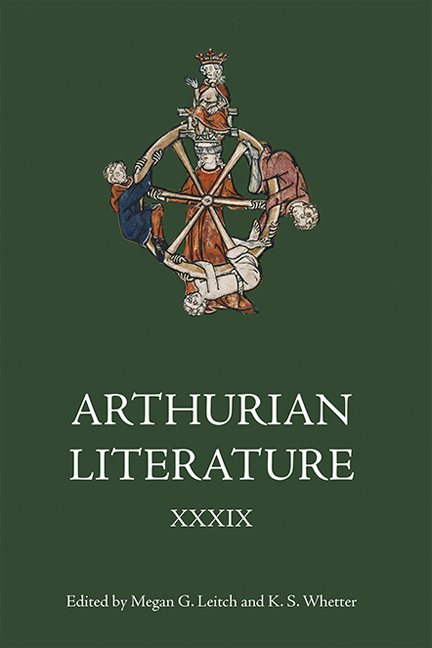Book contents
- Frontmatter
- Contents
- General Editors’ Preface
- List of Contributors
- List of Abbreviations
- 1 The Derek Brewer Essay Prize: Playing Arthur: Making the Elizabethan Mariner
- 2 Ignoring Arthur: Patterns of (In)Attention in Manuscripts of Latin Histories
- 3 ‘Þe place þat ȝe prece to ful perelous is halden’: The Evil Custom in Sir Gawain and the Green Knight
- 4 ‘aske bettyr, I counseyle the’: Requests, Conditions, and Consent in Malory’s ‘Sir Gareth of Orkney’
- 5 Supernatural Transformation in Malory’s Le Morte Darthur
- 6 Personal Piety and ‘semyng outeward’: Self and Identity in Thomas Malory’s ‘Tale of the Sankgreal’
- 7 Evil Will and Shameful Death: Revisiting Law in Malory’s Morte Darthur
- 8 The Return of the Return of Mordred
- In Praise of Elizabeth: Beyond the Books
- Announcement and Details of the Derek Brewer Prize
- Contents of Recent Previous Volumes@
Announcement and Details of the Derek Brewer Prize
Published online by Cambridge University Press: 08 May 2024
- Frontmatter
- Contents
- General Editors’ Preface
- List of Contributors
- List of Abbreviations
- 1 The Derek Brewer Essay Prize: Playing Arthur: Making the Elizabethan Mariner
- 2 Ignoring Arthur: Patterns of (In)Attention in Manuscripts of Latin Histories
- 3 ‘Þe place þat ȝe prece to ful perelous is halden’: The Evil Custom in Sir Gawain and the Green Knight
- 4 ‘aske bettyr, I counseyle the’: Requests, Conditions, and Consent in Malory’s ‘Sir Gareth of Orkney’
- 5 Supernatural Transformation in Malory’s Le Morte Darthur
- 6 Personal Piety and ‘semyng outeward’: Self and Identity in Thomas Malory’s ‘Tale of the Sankgreal’
- 7 Evil Will and Shameful Death: Revisiting Law in Malory’s Morte Darthur
- 8 The Return of the Return of Mordred
- In Praise of Elizabeth: Beyond the Books
- Announcement and Details of the Derek Brewer Prize
- Contents of Recent Previous Volumes@
Summary
Offered in memory of the distinguished medievalist and founder of the D. S. Brewer publishing imprint, part of Boydell and Brewer Ltd, the Derek Brewer Essay Prize is awarded annually for an as-yet unpublished scholarly paper based upon original research on an Arthurian topic within the broad remit of Arthurian Literature.
Candidates for the Prize are normally expected to be either doctoral students in a recognised institution of Higher Learning or within two years of having completed a doctorate (from the date the degree was awarded). The paper should be written in English, between 7,000 and 8,000 words in length (including footnotes), and be prepared according to MHRA Style. The winning paper will be awarded a prize of either £150 in cash or £300 of Boydell & Brewer books, in addition to publication in Arthurian Literature. It is a condition of the Prize that the paper be submitted for exclusive publication in Arthurian Literature.
Candidates should send a covering letter, an abstract (between 200 and 250 words) of their paper, and their entry itself to both editors, Dr Megan G. Leitch and Professor K. S. Whetter, as an email attachment to [email protected] and [email protected], with the three documents combined into one file. The letter should make a statement as to the originality of the work; an indication of how the candidate qualifies for entry to the competition; agreement to the terms of the Prize competition; and name, postal address, email address, and institutional details.
The entries will be judged by a selection committee composed of members of Arthurian Literature's Editorial Board; their decision will be final and no correspondence will be entered into. The Board reserves the right not to make an award should no essay of sufficient quality be entered in a given year.
Entries for the Prize should be submitted to the editors by 31 March each year; the winner will be announced by May of the same year, and the essay will be published in the following year's issue of Arthurian Literature. The inaugural 2022 Prize Essay, for instance, appeared in the 2023 issue (Volume 38).
- Type
- Chapter
- Information
- Arthurian LiteratureA Celebration of Elizabeth Archibald, pp. 171 - 172Publisher: Boydell & BrewerPrint publication year: 2024

